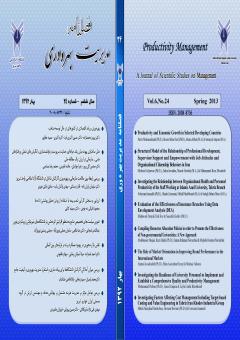مدل ساختاری پیوند میان رشد حرفهای، حمایت سرپرست و توانمندسازی با نگرشهای شغلی و رفتارهای مدنی ـ سازمانی در ایران: یک مطالعه ملی
محورهای موضوعی : مدیریت بازرگانی
محسن گل پرور
1
*
![]() ,
زهرا جوادیان
2
,
مائده عابدینی
3
,
محمد رضا مصاحبی
4
,
زهرا جوادیان
2
,
مائده عابدینی
3
,
محمد رضا مصاحبی
4
1 - عضو هیأت علمی (دانشیار) گروه روانشناسی،واحد اصفهان ،دانشگاه آزاد اسلامی، اصفهان ،ایران
mgolparvar@khuisf.ac.ir
2 - کارشناس ارشد روانشناسی صنعتی و سازمانی دانشگاه آزاد اسلامی خوراسگان، اصفهان
3 - کارشناس ارشد روانشناسی سازمان صنعت
4 - عضو هیئت علمی (دانشیار) دانشگاه آزاد اسلامی، واحد اصفهان، اصفهان -ایران
کلید واژه: توانمندسازی, رفتارهای مدنی ـ سازمانی, حمایت سرپرست, رشد حرفهای, نگرشهای شغلی,
چکیده مقاله :
این پژوهش با هدف بررسی مدل ساختاری پیوند میان رشد حرفهای، حمایت سرپرست و توانمندسازی با نگرشهای شغلی و رفتارهای مدنی ـ سازمانی در ایران به مرحله اجرا درآمد. جامعه آماری پژوهش را کارکنان سه مجموعه صنعتی از شهرهای اصفهان، دورود و شیراز بودند که از میان آنها 899 نفر بر مبنای شیوهی طبقهای و به روش تصادفی ساده انتخاب و پرسشنامههای رفتارهای مدنی ـ سازمانی، نگرشهای شغلی، رشد حرفهای، توانمندسازی و حمایت سرپرست بر روی آنها اجرا شد. دادههای حاصل از پرسشنامههای پژوهش از طریق مدلسازی معادله ساختاری (SEM) مورد تحلیل قرار گرفت. نتایج نشان داد که: 1) رشد حرفهای، توانمندسازی و حمایت سرپرست با نگرشهای شغلی (رضایت و تعهد) دارای رابطه معناداری است (01/0P<). 2) نگرشهای شغلی، رشد حرفهای و حمایت سرپرست نیز با رفتارهای مدنی ـ سازمانی دارای رابطه مستقیم معنادار بودند (01/0P<). مدل ساختاری نهایی پژوهش نشان داد که برای ارتقاء رفتارهای مدنی ـ سازمانی باید نگرشهای شغلی، رشد حرفهای و حمایت سرپرست مورد تقویت قرار گیرند.
This research was carried out with the purpose of studying the structural model of the relationship of professional development, supervisor support and empowerment with job attitudes and organizational citizenship behaviors in Iran. The statistical population consisted of the employees of three industrial complexes in Esfahan, Dorrod and Shiraz, from among whom 899 were selected on the basis of stratified method and simple random sampling. Then, the research instruments, including Golparvar and Refiezadeh’s (2009/2010) organizational citizenship behaviors, job attitudes, professional development, empowerment, and supervisor support questionnaires, were administered to them. The data gathered from the research questionnaires were analyzed using structure equation modeling (SEM). The results revealed that: 1) There is a direct significant relationship between professional development, empowerment and supervisor support with job attitudes (P<0.01). 2) Also, there is a direct significant relationship between job attitudes, professional development and supervisor support with organizational citizenship behaviors (P<0.01). The research structural model revealed that professional development and supervisor support should be reinforced.
Ackfeldt, A.L., & Coote, L.V. (2005), A study of organizational citizenship behaviors in retail setting. Journal of Business Research, 58, 151-159.
Bukhari, Z.U., & Ali, U. (2009), Relationship between organizational citizenship behavior and counterproductive work behavior in the geographical context of Pakistan. International Journal of Business and Management, 4(1), 85-92.
Dalal, R.S. (2005), A meta-analysis of the relationship between organizational citizenship behavior and counterproductive work behavior. Journal of Applied Psychology, 90(6), 1241-1255.
Golparvar, M., & Belali, S. (2010). Model of Promotion of Organizational Civic Behaviors Through Psychological Contract, Job Satisfaction and Organizational Commitment. Second Biennial Congress of Industrial and Organizational Psychology, (In Persian).
Golparvar, M., & Rafizadeh, P. (2009). The Model for Promoting Organizational Citizenship Behaviors through Career Attitudes, Professional Growth, leadership Support and Empowerment. Basirat Quarterly, 16(44), 46-27, (In Persian).
Golparvar, M., & Rafizadeh, P. (2010). The Model for Promoting Ethical Behavior and Organizational Follow-Up Behaviors among Teachers. Quarterly Journal of Education, 26(2), 30-7, (In Persian).
Golparvar, M., Vakili, N., & Vahypour, H. (2009). Relationship between Transformational Leadership Style Components with Job Performance, Organizational Civic Behaviors and Emotional Commitment. The First National Conference on New Findings in Psychology,(In Persian).
Mathieu, J.E., & Zajac, C.M. (1990), A review and meta-analysis of the antecedents, correlates and consequences of organizational commitment. Psychological Bulletin, 108 (2), 171-194.
Sarmad, Z., Bazargan, A., & Hejazi, E. (1997). Research Methods in Behavioral Sciences. Tehran: Agah Publishing, (In Persian).
Shumakher, R. E., & Lumex, R. J. (2009). Introduction to Structural Equation Modeling. Translated by: V. Ghasemi, Tehran: Sociology Publications, (In Persian).
_||_
Ackfeldt, A.L., & Coote, L.V. (2005), A study of organizational citizenship behaviors in retail setting. Journal of Business Research, 58, 151-159.
Bukhari, Z.U., & Ali, U. (2009), Relationship between organizational citizenship behavior and counterproductive work behavior in the geographical context of Pakistan. International Journal of Business and Management, 4(1), 85-92.
Dalal, R.S. (2005), A meta-analysis of the relationship between organizational citizenship behavior and counterproductive work behavior. Journal of Applied Psychology, 90(6), 1241-1255.
Golparvar, M., & Belali, S. (2010). Model of Promotion of Organizational Civic Behaviors Through Psychological Contract, Job Satisfaction and Organizational Commitment. Second Biennial Congress of Industrial and Organizational Psychology, (In Persian).
Golparvar, M., & Rafizadeh, P. (2009). The Model for Promoting Organizational Citizenship Behaviors through Career Attitudes, Professional Growth, leadership Support and Empowerment. Basirat Quarterly, 16(44), 46-27, (In Persian).
Golparvar, M., & Rafizadeh, P. (2010). The Model for Promoting Ethical Behavior and Organizational Follow-Up Behaviors among Teachers. Quarterly Journal of Education, 26(2), 30-7, (In Persian).
Golparvar, M., Vakili, N., & Vahypour, H. (2009). Relationship between Transformational Leadership Style Components with Job Performance, Organizational Civic Behaviors and Emotional Commitment. The First National Conference on New Findings in Psychology,(In Persian).
Mathieu, J.E., & Zajac, C.M. (1990), A review and meta-analysis of the antecedents, correlates and consequences of organizational commitment. Psychological Bulletin, 108 (2), 171-194.
Sarmad, Z., Bazargan, A., & Hejazi, E. (1997). Research Methods in Behavioral Sciences. Tehran: Agah Publishing, (In Persian).
Shumakher, R. E., & Lumex, R. J. (2009). Introduction to Structural Equation Modeling. Translated by: V. Ghasemi, Tehran: Sociology Publications, (In Persian).

